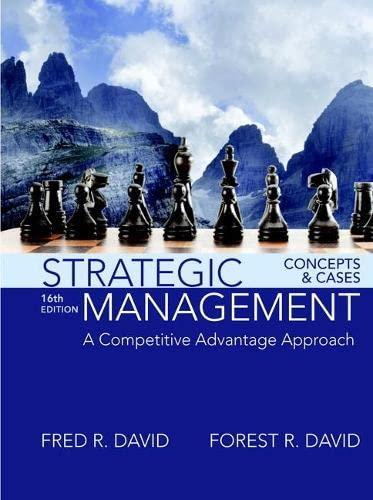Headquartered in Framingham, Massachusetts, tJX Companies is a discount apparel and home fashions retailer in the united
Question:
Headquartered in Framingham, Massachusetts, tJX Companies is a discount apparel and home fashions retailer in the united States and abroad. the company owns t. J. Maxx, Marmaxx, Home goods,
tJX Canada, tJX europe, and Sierra trading Post. it operates about 1,100 t. J. Maxx stores, 950 Marshalls, 450 Home goods, and 4 Sierra trading Posts in the united States alone. tJX’s annual sales of nearly $30 billion are up 50 percent over the past 6 years and company profits have tripled to over $2.1 billion. regarding its corporate strategic planning and evaluating process, tJX is one of the most secretive of all publically held retailers. as discussed in this chapter, there are numerous advantages and disadvantages of being secretive rather than open in revealing corporate strategy. tJX’s Ceo, Carol Meyrowitz, as well as her top executives, rarely give interviews and never discuss corporate strategy.
tJX does not talk about its corporate strategy in part because rival firms are eager to learn this information in order to duplicate, imitate, undermine, and replicate. However, recent research by Fortune reveals that “excellent inventory control” is a secret to the strategic success of tJX, including the following practices:
1. turn inventory over quickly. according to Morningstar, tJX turns over inventory every 55 days,
versus 85 days for its peer group. tJX is structured to buy quickly and sell merchandise. the company shipped about 2 billion units to its stores in its 2014 fiscal year (which ended on February 1),
up from 1.6 billion in fiscal 2010. oftentimes, merchandise is sold before tJX has paid its vendors.
Quick inventory turnover keeps new merchandise on the floor so customers rarely see the same items on repeat visits. tJX trains employees to “buy when you see it; otherwise it will be gone.”
2. Provide “value, trendy merchandise,” not “cheap, leftover merchandise.”
3. Promote the “treasure hunt” experience rather than catering to lower-income customers. even high-income customers love the treasure hunt experience in tJX stores.
4. train buyers extensively and then give buyers autonomy to negotiate millions of dollars of purchases from suppliers. Purchase inventory year-round, continuously rather than seasonally, and purchase as close to the time of need as possible to negotiate a better price and be assured of the latest fashion trend. negotiate low prices for purchases even if it means oftentimes purchasing “all available items in a category.”
Despite performing considerably better than it rival firms, tJX faces heightened competition in the off-price retail industry. For example, nordstrom (JWn) is rapidly expanding its rack stores,
opening 27 off-price new stores in 2016. Macy’s (M) opened four pilot off-price stores in fall 2015,
and neiman Marcus, Saks, and ross Stores (roSt) are boosting their presence in off-price retailing.
Questions
1. What are the advantages and disadvantages of keeping the strategic-planning process secret versus placing the firm’s strategic plan on the corporate website and discussing strategies and planning publically?
2. What are three types of industries where secrecy is warranted and three industries where secrecy is not warranted, or does type of industry even matter?
3. Many colleges and universities have their strategic plan posted on their website. What are the advantages and disadvantages of this practice?
4. rank order the four “secret” practices listed in terms of how important you think the items are to tJX’s overall success. rank the four items from 1 = most important to 4 = least important.
Step by Step Answer:

Strategic Management A Competitive Advantage Approach Concepts And Cases
ISBN: 9780134167848
16th Edition
Authors: Fred R. David, Forest R. David





